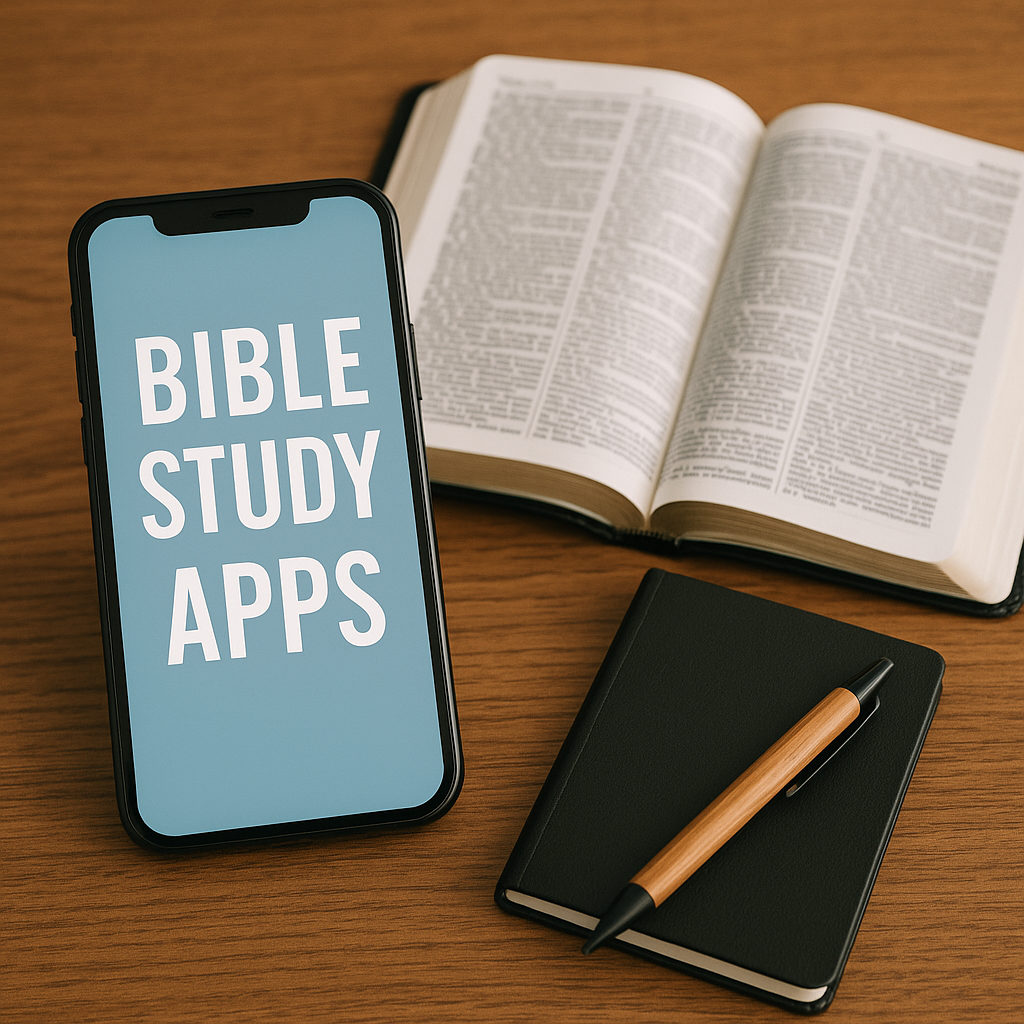Best Bible Study Apps to Help You Read, Understand, and Grow

In today’s world, Bible study apps make it easier than ever to open God’s Word, stay consistent, and grow in faith — no matter where you are. Whether you are new to Bible reading or have been studying Scripture for years, the right app can help you access translations, reading plans, notes, commentaries, and even daily devotionals right on your phone or tablet.
Below are some of the most helpful Bible study apps available today. Each one offers features to support your study habits — whether you want simplicity, deeper tools, or a mix of both. These apps are tools to help you learn Scripture more meaningfully and consistently, not replacements for reading the Word itself.
Studying the Bible can feel overwhelming—especially if you’re just starting out in your walk with Christ. Thankfully, we live in a time where technology makes it easier than ever to open God’s Word and understand it.
Bible study apps are a great tool for beginners and new believers. They provide easy access to Scripture, helpful study notes, reading plans, and even community support—all from your phone or tablet. What’s more! There are bibles that you can just listen to as you are working or meditating on scriptures. I’ve personally seen people in villages who cannot read or write, listen to God’s Word on an audio devices while working in the fields. How amazing is God’s grace! The gospel is indeed reaching the ends of the earth.
Here are five of the best Bible study apps to help you grow in your faith.
1. YouVersion Bible App (The Bible App)
One of the most popular Bible apps in the world, YouVersion offers an incredible variety of features for free. This is also my personal favorite. I have been using this app for a few years now. I have all my favorite versions downloaded for comparison. While I read the entire bible cover to cover every year, this app also helps me go through short devotions addressing different issues of life.
Pros:
- Free access to hundreds of Bible translations (including NIV, ESV, NKJV, and more).
- Thousands of devotional plans on topics like faith, prayer, and overcoming anxiety.
- Easy to use with highlighting, note-taking, and verse sharing.
- Audio Bible options available for many translations.
- Works offline (download versions in advance).
Cons:
- With so much content, beginners may feel overwhelmed at first.
- Devotionals vary in depth—some are very basic.
Best For: Beginners who want a simple, flexible way to read and stay consistent in God’s Word.
2. Logos Bible Study App
Logos is a more advanced tool, but it’s also extremely powerful for going deeper in Bible study. Many preachers use this app to help them prepare their sermons.
Pros:
- In-depth study tools like commentaries, dictionaries, and original-language resources.
- Great for pastors, teachers, and anyone who wants to dig deeper into Scripture.
- Cross-references and word studies built in.
- Free version available, with optional upgrades for larger libraries.
Cons:
- Can feel overwhelming for beginners without guidance.
- Advanced resources can be expensive.
Best For: Those ready to go beyond surface-level study and invest in serious Bible learning.
3. Olive Tree Bible App
Olive Tree provides a clean, distraction-free reading experience with powerful study features.
Pros:
- Simple and easy-to-navigate interface.
- Wide selection of free and paid study resources.
- Split-screen feature (read Bible and commentary side by side).
- Notes and highlights sync across devices.
Cons:
- Some key study tools are locked behind paid upgrades.
- Not as community-focused as YouVersion.
Best For: Christians who like a simple design but also want deeper study options.
4. Blue Letter Bible App
Blue Letter Bible is designed for those who want to understand the Bible in its original depth. I very often go to this resource albeit on the web version while preparing my messages, sermons, and devotions.
Pros:
- Strong emphasis on original Hebrew and Greek word studies.
- Lots of free study resources: commentaries, cross-references, concordances.
- Easy to look up deeper meanings of Scripture.
- Free to use.
Cons:
- Interface looks outdated compared to other apps.
- Can feel intimidating for new Christians without guidance.
Best For: Believers who are curious about what the Bible says in its original languages.
5. Bible Gateway App
Bible Gateway is a trusted name that offers a simple and reliable app for Bible reading and study. I often use their web version while preparing sermons and devotions.
Pros:
- Access to over 200 Bible translations.
- Daily devotionals and reading plans.
- Audio Bibles for listening on the go.
- Easy verse lookup and keyword search.
Cons:
- Free version includes ads.
- Advanced resources and study guides require a premium subscription.
Best For: Beginners who want a trustworthy and straightforward Bible reading experience.
Tips for Choosing the Right Bible App
If you’re just beginning your Bible journey:
- Start simple with YouVersion or Bible Gateway. They’ll help you build consistency and confidence.
- If you’re curious to dig deeper, Blue Letter Bible and Olive Tree are great next steps.
- For serious long-term study, Logos will become an invaluable resource.
Remember—these apps are tools, not replacements for a relationship with Jesus. The goal of Bible study isn’t just information, but transformation. Open God’s Word, invite the Holy Spirit to guide you, and take one step at a time.
Nothing actually replaces opening a real Bible and flipping the pages. That is a whole different experience altogether. My old Bible is all highlighted, underlined, with notes scribbled on the sides. When you re-read some of the passages and go through your own scribblings, you begin to ponder on what the Lord spoke to you months ago. Sometimes, you realize, you got it all wrong. Ha ha…and then you correct yourself by writing down what the Holy Spirit is speaking to you today in a separate journal. Get a Life Application Study Bible for yourself if you can.
How Bible Study Apps Fit Into Your Growth
Apps can support your study rhythm, but they work best when paired with other practices like prayer, reflection, and consistent reading. If you’re new to Bible study, you may also find our Bible Study for Beginners guide helpful.
No app replaces the presence of Christ or the transformative power of the Holy Spirit — but the right tools help you engage with Scripture in ways that deepen your understanding and faith.
Reflection for Beginners
- Don’t feel pressure to understand everything right away. The Bible is a lifelong journey, not a quick course.
- Pick one app, start small, and let God’s Word speak to your heart daily.
- Consistency matters more than complexity. A few verses read with prayer can do more than hours of study without faith.
If you want to explore Bible study methods beyond apps, check out Bible Study. Learn how to read the Bible meaningfully with tools and habits.
